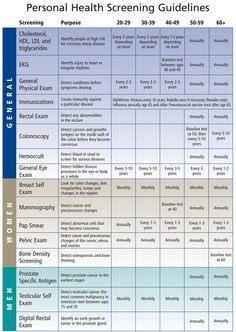
Essential Screenings and Exams for Women of All Ages
Introduction
Women’s health plays a crucial role in maintaining overall well-being. Regular screenings and exams are essential to detect any potential health issues at an early stage and ensure prompt treatment. Regardless of age or medical history, women should prioritize these screenings to protect their health and promote prevention.
Annual Physical Examination
An annual physical examination is the foundation of women’s preventive care. It involves a comprehensive assessment of your overall health, including checking vital signs, measuring height and weight, and evaluating reflexes. Additionally, your healthcare provider may conduct a breast and pelvic exam, and perform a Pap smear and a mammogram, depending on your age and risk factors.
Blood Pressure Monitoring
High blood pressure is a leading cause of cardiovascular diseases which can severely impact women’s health. Regular blood pressure monitoring is crucial, especially for women above the age of 40. Maintaining a healthy blood pressure level can reduce the risk of heart disease, stroke, and other related complications.
Cholesterol Screening
Elevated cholesterol levels can increase the risk of heart diseases. Women should start getting cholesterol screenings regularly in their 20s, and more frequently after the age of 45. Early detection allows for lifestyle changes and interventions to manage cholesterol levels, such as adopting a healthy diet, regular exercise, and prescribed medication if necessary.
Breast Cancer Screening
Regular breast cancer screenings are vital for early detection and effective treatment. Women should receive a clinical breast exam at least once every three years starting from the age of 20. Mammograms are recommended for women between 40 and 50 years old, and should be done annually thereafter. Women with a family history of breast cancer may need to start screenings earlier.
Comprehensive Gynecological Exams
Gynecological exams focus specifically on reproductive health. These examinations are important for monitoring the health of women’s reproductive system, detecting sexually transmitted infections (STIs), and preventing cervical cancer. Regular pap smears are recommended for women aged 21 to 65, or as advised by their healthcare provider.
Bone Density Testing
Osteoporosis is a common condition affecting women, especially after menopause. Bone density testing, also known as a DEXA scan, assesses the strength and density of bones and helps identify signs of osteoporosis. Women aged 65 and above or those at higher risk should consider getting this screening to prevent fractures and maintain bone health.
Colorectal Cancer Screening
Colorectal cancer screenings are crucial for women above the age of 50. Options for screening include colonoscopy, sigmoidoscopy, and certain stool tests. Early detection significantly improves the chances of successful treatment. Regular screenings can help detect polyps or abnormal growths and prevent the development of colorectal cancer.
Conclusion
Caring for one’s health is of utmost importance, and regular screenings and exams are essential components of a woman’s healthcare routine. By prioritizing these screenings, women can identify potential health concerns at an early stage and take proactive steps towards prevention and treatment. Always consult with your healthcare provider to determine the most appropriate screenings based on your age, risk factors, and medical history. Remember, prevention is the key to a healthier and happier life.

